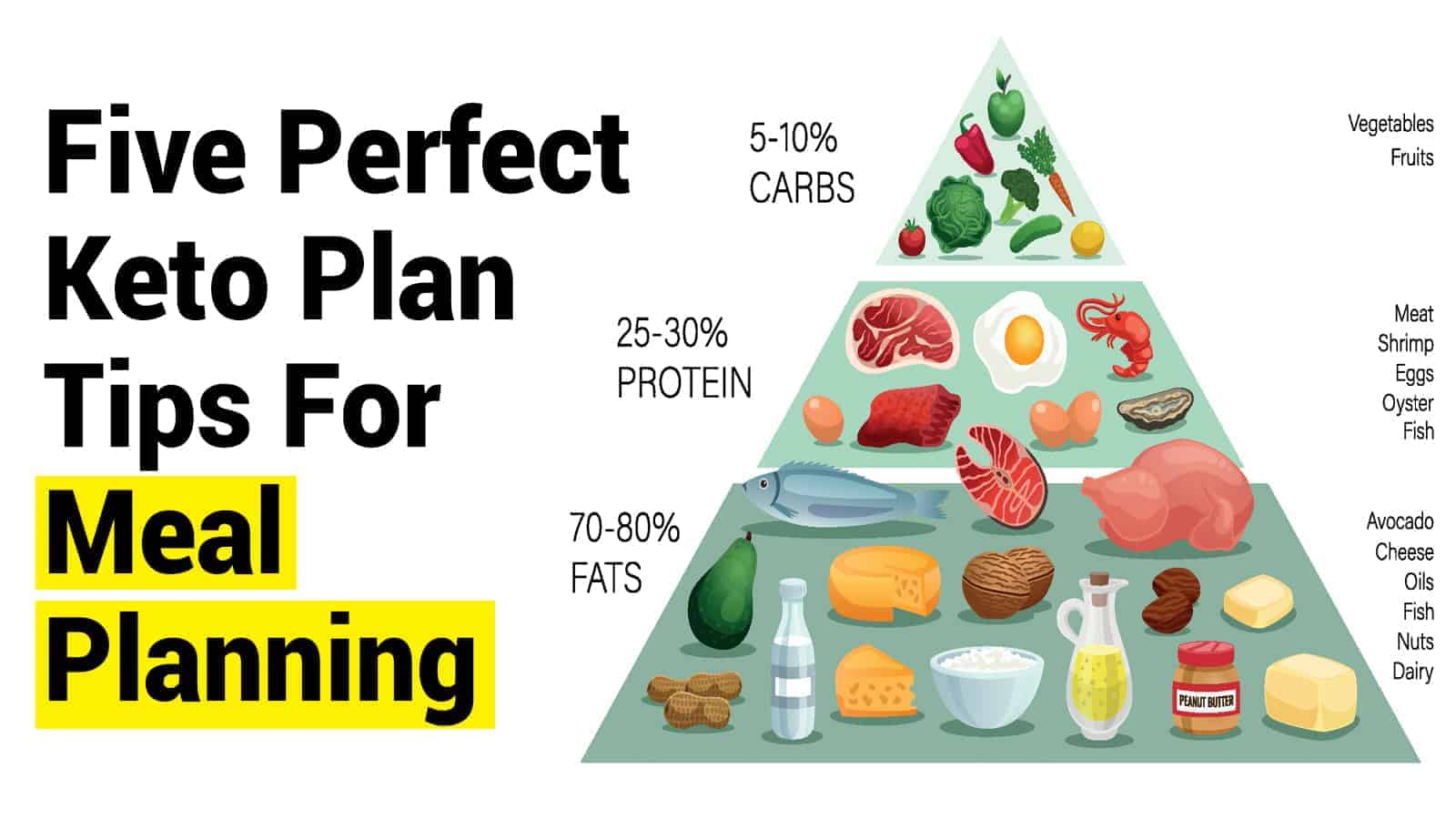You’ll want to start meal planning when creating the perfect keto plan. When you don’t know where to start, it can be hard and overwhelming, leading to mistakes. Planning for your keto diet can save time, money, and effort and ensure you stick to the diet plan.
Having a meal plan and structure is one of the most significant ways to ensure success. The extra time spent planning and prepping will help you keep your willpower on days of weakness. Plus, it helps ensure you include all the nutrients and vitamins you need.
Planning also helps ensure you don’t eat foods prohibited on keto. By thinking ahead, you’ll have everything you need to lose weight. You’ll also be more likely to adopt long-term healthy habits.
Changing your eating habits is hard enough, but keto requires following a strict menu. Because of the drastic change, it’s hard to stick to, and you might be tempted to give up quickly. Following these tips will give you the motivation you need to keep going.
What Is the Keto Diet?
The ketogenic diet is a strict plan to improve weight loss and focus. It requires maintaining a specific ratio of carbs, protein, and fat so that your body reaches a ketosis state. If you follow a keto plan, you must drastically limit your daily carb intake.
 Five Keto Plan Tips
Five Keto Plan Tips
With keto being so strict, planning is essential. With planning, you’ll be more likely to stick to the dietary guidelines while still taking in enough nutrients.
1. Get Everything Ready to Follow a Keto Plan
Before starting your keto planning, getting your pantry and refrigerator ready is best. When following a strict diet, having everything ready and easy to access can make all the difference in your success.
Start by investing in food containers that are versatile and microwave-safe. Microwave-safe containers allow you to pack meals for when you won’t be at home, allowing you to stick to your plan. Having containers ahead of time helps you to plan your meals and portion them out accordingly. If your microwave ever malfunctions, a trusted Microwave Repair service can ensure it’s working efficiently so you can continue your meal prep without interruption.
As you prepare to start planning, you’ll want to remove temptations from your home. Get rid of any foods you are supposed to avoid to ensure you stick to your goals. You’ll want to make sure your refrigerator and pantry don’t have any of the following:
- Grains, including wheat, bread, pasta, rice, oats, corn, and cereal
- Sugar, including candy, cakes, and ice cream
- Starchy vegetables, such as potatoes, sweet potatoes, and parsnips
- Legumes, including beans and chickpeas
- High-sugar fruits, including oranges, apples, bananas, pineapple, and grapes
- Low-fat dairy, including cow’s milk and low-fat cheese
- Vegetable and seed oils, including margarine, canola oil, corn oil, soybean oil, and grapeseed oil
- Processed
If other people in your home don’t want to or can’t participate in the diet, you might be unable to eliminate all these foods. If that is the case, you should store all of these foods together in one place. Then, you’ll only have to avoid one cupboard, pantry, or shelf.
2. Make Your Grocery List and Stock Up to Stick With Your Keto Plan
Before your start date, make a grocery list and stock up on ingredients you’ll use often. Making a grocery list helps you stay on track and buy only what you need for your ketogenic diet. Some of the foods you’ll often use are:
- Protein from seafood, meat, tofu, and yogurt
- Healthy fats from avocado, coconut oil, olive oil, eggs, coconut milk, and nuts
- Non-starchy vegetables, including kale, spinach, broccoli, onions, peppers, eggplant, and asparagus
You can stock up on frozen ingredients or things with a long shelf life. Then, you’ll have everything on hand when you’re ready for planning. Plus, if you need to come up with a meal on a whim, you’ll have plenty of keto-friendly ingredients.
Many pantry ingredients are processed and high in carbs, so you’ll want to stock up on ones that aren’t. Consider the following pantry staples to help with your keto planning:
- Herbs and spices, including basil, dill, and cinnamon
- Keto-friendly condiments
- Seeds and nuts, including sunflower seeds, almonds, and macadamia nuts
- Sugar-free sweeteners
- Low-carb flour, such as flaxseed meal, coconut flour, and almond flour
- Sugar-free drinks
You will also want to stock your refrigerator with keto-friendly foods. Stock it with ingredients for meals, but also stock up on snacks. Consider the following foods:
- Beef and pork
- Chicken and turkey
- Leafy greens
- Fish and shellfish
- Full-fat dairy
- Eggs
- Fruit that is low in carbs
 3. Start Simple and Find Your Favorites
3. Start Simple and Find Your Favorites
When you’re starting the diet, you’ll want to start simple. Once you get more comfortable with the diet, you can experiment a little, but sticking to a basic framework can help. Start by choosing a protein, a low-carb vegetable, and healthy fat, then develop your meal plan.
If you’re used to a high-carb diet with lots of sugar, you’ll want to avoid switching to keto all at once. Start by gradually cutting back on those things while replacing them with keto-friendly options. Doing it this way helps you adjust gradually without developing side effects.
Additionally, as you switch from an unhealthy diet to a keto plan, you should start by cutting out sugars. Eliminate soda and candy from your diet, and cut out complex carbs from bread and pasta next. Last, eliminate starchy vegetables and high-sugar fruits.
Start simple by choosing easy recipes and finding a few favorites right away. Look at your favorite recipes and see if you can adjust them to follow your diet. You don’t have to do a complete overhaul of your menu when you do it this way.
Another way to start simple is by meal prepping for only a few days worth of food at a time rather than a whole week. Some people even like to meal prep for two weeks, but you don’t have to go that far. Do whatever amount you’re comfortable with so that you’re more likely to stick to it.
4. Batch Cook and Use Frozen Ingredients
Once you have your plan and you’ve gone grocery shopping, start batch cooking. When you batch cook, it helps you stay on track with your diet. Batch cooking is when you set aside a few hours to cook and portion out meals for the upcoming days or weeks.
The best foods to batch cook are stews, soups, casseroles, and sauces. Batch cooking helps you eat healthy and delicious dinners each night of the week without much prep work. While it takes a while to batch cook, it’ll save you lots of time and stress throughout the week.
As you batch cook, consider doubling the ingredients to separate them into multiple meals. You can store the extra food in containers for lunch or dinner another night or freeze it. When you freeze it, you have a portion of another meal already cooked and ready to dethaw for use.
You can also make cooking meals easier by using frozen ingredients. You can buy frozen, pre-chopped veggies at the grocery store if you use vegetables in your meals. Frozen food doesn’t typically spoil and makes batching cooking easier.
5. Learn How to Avoid the Keto Flu
The keto flu happens as your body works to adjust to your new diet. When your body stops using glucose and carbohydrates for fuel, it uses ketones and fat instead. Entering a state of ketosis is a big adjustment for your body.
Ketosis flushes stored water from your body, potentially causing your electrolyte levels to dip. When this happens, it triggers the symptoms of the keto flu, including:
- Dizziness
- Headache
- Unexplained tiredness or fatigue
- Irritability
- Restlessness
- Nausea
- Muscle soreness, weakness, spasms, or cramps
- Stomach bloating or pain
- Diarrhea or constipation
- Poor concentration
- Confusion or brain fog
- Lack of motivation
- Intense sugar cravings
- Insomnia
- Impaired coordination
Luckily, the keto flu is avoidable, so learn as much as you can about avoiding it before starting your plan. The most important thing to know is to get enough electrolytes, including sodium, potassium, and magnesium. Adding salt to your food can help, but easing into the diet slowly and drinking plenty of water is your best bet.
 Final Thoughts on Perfect Keto Plan Tips for Easy Meals
Final Thoughts on Perfect Keto Plan Tips for Easy Meals
While starting keto can be overwhelming, you can use these tips to ensure success. These keto plan tips for planning will help you prepare the best foods ahead of time. It saves you time later in the week and helps you stick to your plan even on busy nights.
Plus, planning for the diet can help you eat healthy breakfast and lunch options. Lunch is hard for sticking to your diet because getting processed food is the easiest option. If you have your meals planned and prepared beforehand, you won’t have an excuse to skip the healthy meal you have already prepared.
As you start your keto plan, use these tips to help you reach success. These diet planning tips will help you ensure you get all of your essential nutrients while sticking to your diet plan.


















